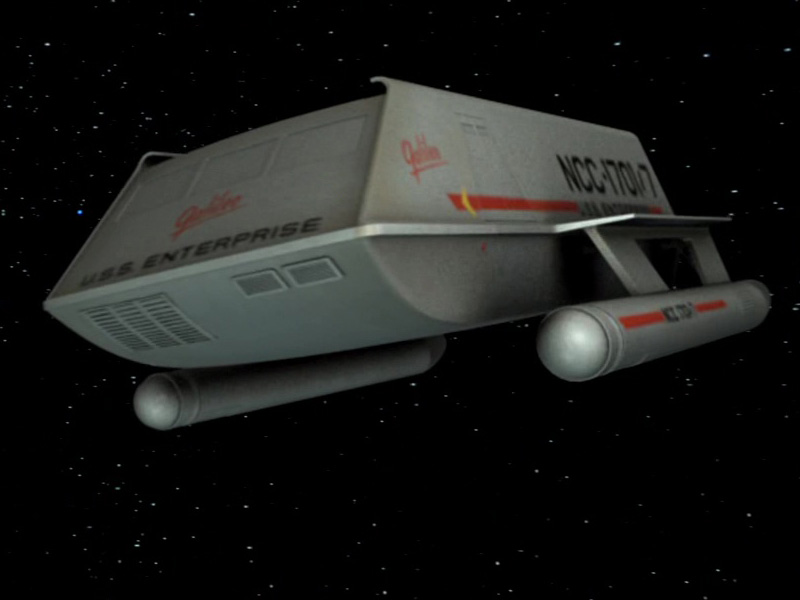Difference between revisions of "Class F shuttlecraft"
(Created page with "[[File:shuttlecraft_class-f-tos-31.jpg|350px|thumb|right|Class F Shuttlecraft<ref name="TOS31"/> ==Specifications== {| style="width:99%;" |- | style="text-align:right;" | Crew...") |
m |
||
| (12 intermediate revisions by the same user not shown) | |||
| Line 1: | Line 1: | ||
| − | + | {{MyriadShuttlecraftClassF}} | |
| − | + | {{ImageInfoBox2|file=shuttlecraft_class_f-tos31.jpg|caption=Class F shuttlecraft ({{TOS31}})}} | |
| − | {| | + | {{FirstDate|TOS14|1967|1|5}} |
| − | | | + | {{Ad|AmazonTOSBD}} |
| − | | | + | |}</div> |
| − | | | + | {{banner|Prime}} |
| − | | | + | Class F shuttlecraft had a hull constructed of {{link|Prime|duranium}} and were powered by {{link|Prime|ion engines}}.<ref name="TOS16A"/> The shuttles were 24 feet long<ref name="TOS14"/> and were equipped with {{link|Prime|warp drive}}.<ref name="TOS16A"/> The class was designed for two pilots, and could carry up to six passengers.<ref name="TOS14"/> |
| − | + | {{ClassFShuttles}} | |
| − | + | {{References}} | |
| − | | | ||
| − | | | ||
| − | | | ||
| − | |||
| − | |||
| − | |||
| − | | | ||
| − | |||
| − | |||
| − | |||
| − | |||
| − | |||
| − | |||
| − | |||
| − | The | ||
| − | |||
| − | |||
| − | |||
| − | |||
| − | |||
| − | |||
| − | |||
| − | |||
| − | |||
| − | |||
| − | |||
| − | |||
| − | |||
| − | |||
| − | |||
<references> | <references> | ||
| − | <ref name=" | + | <ref name="TOS14">{{RefTOS14}}</ref> |
| − | + | <ref name="TOS16A">{{RefTOS16A}}</ref> | |
| − | |||
| − | <ref name=" | ||
</references> | </references> | ||
| + | [[Category:Library]] | ||
| + | [[Category:Ships & Vehicles]] | ||
| + | [[Category:Ship Classes]] | ||
| + | [[Category:Auxiliary Craft]] | ||
| + | [[Category:Shuttlecraft]] | ||
| + | [[Category:TOS]] | ||
| + | [[Category:Film]] | ||
| + | [[Category:Prime Timeline]] | ||
Latest revision as of 08:57, 22 August 2023
| First Appearance | TOS14 (5 Jan 1967) |
| Advertising |
Class F shuttlecraft had a hull constructed of duranium and were powered by ion engines.[1] The shuttles were 24 feet long[2] and were equipped with warp drive.[1] The class was designed for two pilots, and could carry up to six passengers.[2]
Shuttlecraft F class vessels
Shuttlecraft Columbus NCC-1701/2 • Shuttlecraft da Vinci SB4-0314/2 • Shuttlecraft Einstein NCC-1701/6 • Shuttlecraft Galileo NCC-1701/7 • Shuttlecraft Galileo II NCC-1701/7 • Shuttlecraft Picasso SB11-1201/1
Columbia Timeline
Shuttlecraft Columbus NCC-1701/2 • Shuttlecraft da Vinci SB4-0314/2 • Shuttlecraft Galileo NCC-1701/7 • Shuttlecraft Galileo II NCC-1701/7 • Shuttlecraft Icarus NCC-1701 • Shuttlecraft Kepler NCC-470 • Shuttlecraft Kepler NCC-1701 • Shuttlecraft McAuliffe NCC-1647 • Shuttlecraft Picasso SB11-1201/1
FASA Timeline
Shuttlecraft Columbus NCC-1701/2 • Shuttlecraft da Vinci SB4-0314/2 • Shuttlecraft Galileo NCC-1701/7 • Shuttlecraft Galileo II NCC-1701/7 • Shuttlecraft Picasso SB11-1201/1
STO Timeline
Shuttlecraft Columbus NCC-1701/2 • Shuttlecraft Copernicus NCC-1500 • Shuttlecraft da Vinci SB4-0314/2 • Shuttlecraft Galileo NCC-1701/7 • Shuttlecraft Galileo II NCC-1701/7 • Shuttlecraft Picasso SB11-1201/1
Myriad Universes
Shuttlecraft Apollo NCC-1834 • Shuttlecraft Armstrong NCC-1701 • Shuttlecraft Balboa NCC-1622
Notes and References
- ↑ 1.0 1.1 Roddenberry, Gene (Executive Producer). "The Menagerie, Part I." Star Trek, Season 1, Episode 11 (Production 16). Directed by Marc Daniels and Robert Butler. Written by Gene Roddenberry. Desilu Productions, 17 November 1966.
- ↑ 2.0 2.1 Roddenberry, Gene (Executive Producer). "The Galileo Seven." Star Trek, Season 1, Episode 16 (Production 14). Directed by Robert Gist. Story by Oliver Crawford Teleplay by Oliver Crawford & S. Bar-David. Desilu Productions, 5 January 1967.

